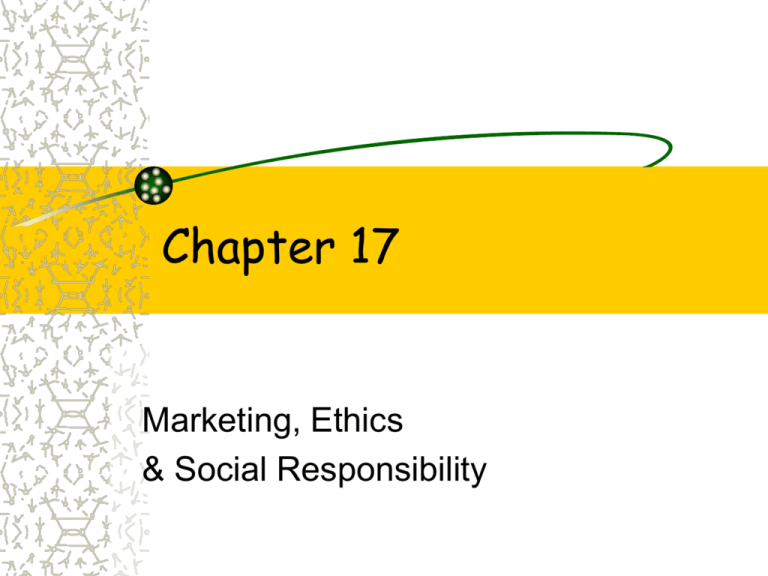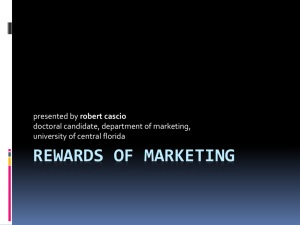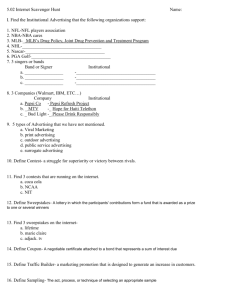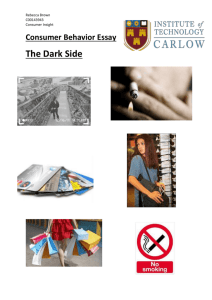CB_6e_Ch17_MarketingEthicsCSR
advertisement

Chapter 17 Marketing, Ethics & Social Responsibility Learning Objectives To understand: 1. Compulsive buying, consumer theft, & black markets, & ethical questions associated with them 2. Deviant behaviors of consumer theft, black markets & underage smoking & drinking 3. Ethical questions facing marketers 4. Environmental consciousness & conservation 5. Consumers resist marketing practices, individually & in groups Deviant Consumer Behavior Addictive/Compulsive Consumption Deviant Acquisition Behavior Addiction Chemical dependence Compulsive—Irresistible urge to perform irrational act, e.g., gambling stages – Pleasure of “big win” – Becomes central force of individual’s life Engage in crime to finance – Realization of hitting rock bottom Causes – Inherited tendencies – Family-related factors Above the influence abovetheinfluence.com is a webpage presented in a format that discourages underage drinking, smoking and drug use. The site makes its point by providing facts, video games, testimonials, and sources of help for young people. Addictive Behavior Usually brought on by chemical dependency Perceived or chemical dependence on product or activity Repeated use of product, even if dangerous Can be harmful to addicts & those around them Examples: cigarettes, drugs, alcohol, Internet use (facebook, eBay), gambling, video games, etc. You can be addicted to shopping, online shopping, and other marketplace endeavors Compulsive Behavior Compulsive consumption – Eating – Buying – Gambling – How is impulsive consumer behavior different than compulsive cb? Compulsive Buying The Experience – Low Self-Esteem – Fantasy Orientation – Alienation – Family History Consequences – Financial – Emotional – Interpersonal Impulsive Behavior Impulsive buying Impulsive eating Impulsive shopping Influence by consumer’s promotion or prevention focus Marketing Implications Do marketing activities encourage addictive, compulsive, & impulsive behavior? Does marketing/advertising cause these behaviors? Marketing activities to reduce addictive & compulsive behavior Marketing activities that stimulate impulsive behavior Consumer Theft Prevalence – Retail: $41.6 billion – Nonretail Psychological Factors Affecting – Temptation to steal – Ability to rationalize behavior Motivations for Theft Consumer Theft Consumer theft can be a marketer’s problem Theft includes return fraud, counterfeit, & other sneaky ways to take from companies or their earned brand equity Increased usage of theft-reducing devices (mirrors, tags, alarms) Some stores employ guards (e.g., Tiffany & Co.) Coverings costs of theft Reducing ability to serve customers What would you as a marketer/businessperson do regarding theft from your business? Black Markets “…situations in which consumers pay (often exorbitant amounts) for items not readily available…sellers are unauthorized.” Example: Cuban Cigars Legal Items in Short Supply Brands Illegal Items What are some examples of products on the black market and are they still “marketed”? Underage Drinking & Smoking Prevalence Consequences Marketing Implications – Product availability – Exposure to advertising – Targeting youth – Inappropriate message in media/ads – Warning labels/ads Advertising to Children~ Issues Did you watch a lot of TV as a child? Did it impact you positively or negatively? Issues: Undeveloped cognitive abilities Unable to store/retrieve information in long-term memory Prey on needs Teach children materialism, act on impulse, immediate gratification Do not understand cost Host selling Types of products Advertising to Children~ Solutions Solutions to consider: Parental Control Program/Advertising Separator Limits to amount of advertising per hour Public Service Announcements (PSAs) Children’s Advertising Review Unit—Better Business Bureau Educational Initiatives Marketing & Obesity Link between junk food advertising & childhood obesity Less guilt in eating low-fat snacks Underestimate of calorie content of meals Unhealthy food perceived as tastier Does marketing/advertising cause obesity? Advertising & Self-Image Idealized Body Images – Obsessions with thinness – Thinness, advertising, & self- perceptions = Social Comparisons Theory Materialism – Consumers less satisfied – Family influences – “Good life” Sex in Advertising When is sex in advertising unethical If at all, in your opinion? ©adage.com Consumer Privacy Sources of Marketing Information – Tracking purchases – Applications – Marketing research – Public domain Consumer Responses – Uncomfortable – Complaints – Lack of trust – Data has errors Marketing Implications Horror stories hurt all marketers Communicating how information gathered helps consumers Laws & self-imposed regulation Markets for privacy protection Respect privacy; What would you want done to you and your family? Think of this and hold it to high esteem in your career. Corporate Social Responsibility Environmentally conscious behavior Conservation behavior – How can marketers motivate people to conserve for long-term sustainability? Market Resistance Individual Resistance—Word-of-mouth Retail Resistance (e.g., anti-Hallmark) Market Resistance (anti Valentine’s Day) Advocacy Groups—Inform public about business practices Boycotts – Avoid purchasing – Companies held accountable – Gain publicity – Hurt company financially Questions?



